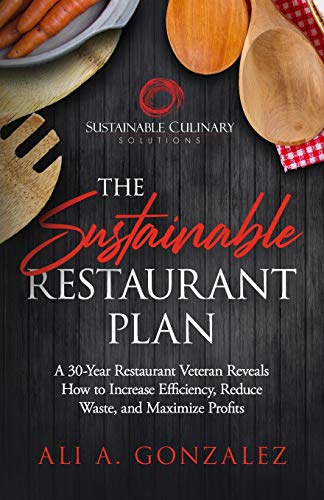Transform the Terrible Repercussions of Food Waste Into a Healthy Lifestyle

Ali Gonzalez
Sustainable Culinary Solutions

Food Waste Impacting the Environment and Climate
To understand the consequences caused by food waste, you need to see the negative life-changing impact it has created on our country. This leads to the topic of the Environmental impacts of US Food Waste.
- Greenhouse Gas Emissions
- Enough Water & Energy – to supply more than 50 million homes.
- Amount of Fertilizer used in the U.S. to grow all plant-based foods for U.S. human consumption.
You may ask yourself, how much food does the world waste? Well, 1.4 billion tons of food is wasted every year around the globe, yet 690 million people will starve from not having any food. The United States throws out more food than any other country in the world. This amounts to 40 million tons, which is about 88 billion pounds every year. That’s estimated to be 30-40% of the entire US food supply and equates to 219 pounds of waste per person. Globally, we waste about 1.4 billion tons of food every year.
Uneaten food and food preparation waste come from a variety of places such as homes and businesses. For example, this includes: grocery stores, restaurants, produce stands, cafeterias, kitchens, and employee lunchrooms.
There are many ways that we can stop food waste at home, in the office, in restaurants, and on farms. These results can be found through online research.
I would like to bring attention that no one truly talks about why there is so much food being wasted. You should be asking yourself how is this affecting your overall well-being? And how else can you reduce food waste, besides approaching this at home? Well, let’s take a deeper look into the problems and why this has been unfortunately increasing over the years.
We Cannot Find Pickers to Pick the Crops
Economic Research Service (ERS) estimates that $161.6 billion of food at the retail and consumer stage of the supply chain goes uneaten yearly. Through the entire supply chain, the Food and Agriculture Organization of the United Nations estimates that 30% of global food loss occurs at the agricultural production and harvest stage, 6% at post-harvest, 3% at processing and packaging, 18% at retail and distribution, and 42% at consumption.
What Really Caused This?
You may read that costs of labor, but if you recall back around 2004 most companies were being audited for immigrants. This led to the layoffs of several thousand workers on farms and in the hospitality industry.
How Do Everyday and Well-Respected Businesses Contribute to Food Waste?
Everywhere you shop or dine they promote:
- BIGGER
- Supersize Your Meal
- Meal With Combo
- Restaurants promote happy hour – get half price for an appetizer, discounts on drinks, unlimited soft drinks, and most of all they try to upsell you with soup, salad, entree, and dessert.
- Restaurants serve large portions of food – this creates the wow effect and keeps you coming back as you only see the value.
- Supermarkets sell in bulk or combo packs now – in return most of these food products go to waste as most households don’t have proper storage or turn to fast food during the week.
As you can see institutions are driving food waste across the U.S. In return this translates to more packaging and creating obesity. We are pushing the newer generations into eating more processed and unhealthy large portioned foods. Sadly, this is leading to health problems and shorter lives. Eventually, this becomes food waste and is overproduced because we don’t eat it and the food gets thrown out.
Over 40 percent of Americans are overweight today, and you cannot say the cause is metabolism.
As your curiosity increases, it’s tempting to ask what has contributed to the largest role in obesity? The answer is the typical Western diet and frequent large meals that are high in refined grains, red meat, unhealthy fats, and sugary drinks. Foods that are lacking in the West are vegetables, fruits, diet-whole grains, and nuts. These underplayed, yet flavorful foods help with weight control and help prevent chronic diseases.
5 Benefits to Encourage You to Prevent Food Waste
As mentioned earlier, putting a stop to food waste helps the environment by reducing greenhouse gas emissions and carbon footprint. There are several ways on how preventing food waste can benefit you:
- Saving money on groceries and eating out, especially relevant in today’s recent increasingly high inflation
- Living a healthier lifestyle, you won’t have to worry as much if you’re overeating
- Well-arranged kitchen and refrigerator, without the hassle of spoiled and cluttered food
- Clean kitchen and dining area, reducing bacteria and household pests such as cockroaches, ants, and flies.
- Decrease in trash, less garbage to dispose of and more ways to reuse food scraps
All This Is Considered a Toxic Food Environment
So What Is the Solution?
Innovation has become increasingly relevant and can be implemented to reduce food waste. You can contribute to an eco-friendly environment by using methods such as upcycling and composting food. For example, instead of letting your bananas turn black and mushy, you can upcycle them. Luckily there are a variety of ways to do this, such as making delicious banana flavored:
- Smoothies
- Dried Chips
- Bread
It has been statistically proven that 39% of consumers look for upcycled food products. Recent technology has also been used in methods to make food last longer on the shelves. This allows for certain foods to last longer without getting spoiled so soon.
Giving people advice on how to reduce food waste at home is a great start, but that will not be the solution in the long run as Americans dine in restaurants, order take out/delivery, and buy pre-made foods. These all are here to stay. The biggest effect we can have is starting with the institutions – reducing portion size, marketing towards healthy alternatives, and education in the public schools. You can take part today in making the environment a healthier place for yourself and others to live in.
Want to learn more about how to prevent food waste? Get started today with a consultation call, in which we will discuss all your goals. All you have to do is tap this link: https://sustainableculinarysolutions.com/contact/ and fill out a quick form to get into contact.
Still Planning?
The Sustainable Restaurant Plan
You can get started with my book which reveals how to increase efficiency, reduce waste, and maximize profits.

Latest Trends







